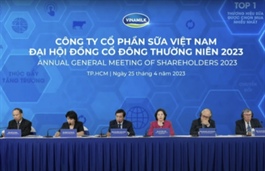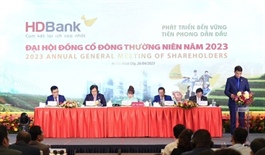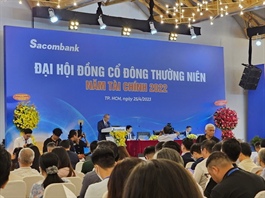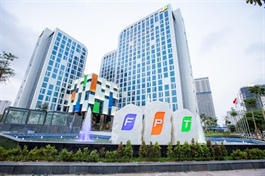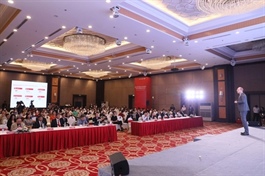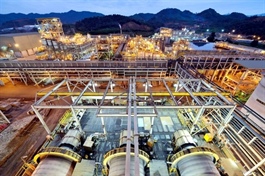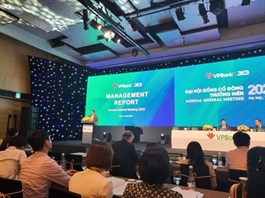SABECO (SAB) steadfast in growth goals
SABECO (SAB) steadfast in growth goals
Recognising the opportunities and challenges ahead, the board of directors at Saigon Beer-Alcohol-Beverage Corporation, known as SABECO, continues to set sustainable growth goals to create tangible action for long-term development.

SABECO’s general director Bennett Neo said at last week’s AGM that the operating environment remains challenging and uncertain. With the intensifying competition landscape and the fear of economic slowdown, the company is cautiously optimistic about its business growth and performance.
“Against this backdrop, we remain committed to delivering our short-term and long-term priorities. We will continue to defend and grow market share as well as sales volume, both sustainably and profitably, continue to drive productivity improvements, and mitigate input cost pressures,” Neo said. “I am confident that with the relentless efforts across SABECO, we will be able to ensure the company achieves the next level of success,” Neo said.
Golden opportunities
This year has offered up more opportunities for Vietnam’s beer industry because of Vietnam’s current so-called golden population structure, fast-rising incomes, and more consumption from younger people and females.
SABECO is projecting net revenues of VND40.28 trillion ($1.72 billion) for 2023 as a whole, an increase of 15 per cent on-year, and an after-tax profit of VND5.78 trillion ($246 million), up 5 per cent on-year.
The company also reaped sweet results when net revenues in 2022 increased by 33 per cent over the same period, reaching nearly VND35 trillion ($1.5 billion). Profit after tax hit nearly VND5.5 trillion ($234.3 million), up 40 per cent compared to 2021.
The impressive business results in the past year are an effective testament to the enterprise’s comprehensive efforts in promoting marketing and sales initiatives, researching new products, and controlling input material costs. Meanwhile, it has improved operational efficiency across the entire supply and manufacturing chain through the SABECO 4.0 digital transformation initiative.
However, forecasts from the International Monetary Fund show that the world’s three largest economies – China, the European Union, and the United States – will slow down in 2023, reflecting risks that have become realities.
The World Bank also acknowledges that the growth of exports and domestic demand will slow down, and Vietnam’s exports are being hit by weaker external demand. Post-pandemic consumption may not recover quickly as earlier anticipated, while tighter financial mobilisation conditions and rising inflation may affect the domestic market as well.
The Organisation for Economic Co-operation and Development stated that the global outlook is also increasingly tilted in favour of Asia’s emerging large-market economies, accounting for nearly three-quarters of global GDP growth in 2023, reflecting a slowdown in the economic outlook for the US and Europe. International organisations state that Vietnam’s economy is still developing at a reasonable rate, although it has been projected to drop compared to last year.
With 26 breweries, 11 trading businesses, and a distribution network consisting of thousands of merchants nationally, SABECO views both consensus and social responsibility to be the essential ideals that will contribute to its development.
To become an industry-leading business and a pioneer in innovation for positive development and common prosperity, its corporate social responsibility policy focuses on the following 4Cs commitment of consumption, conservation, country, and culture.
Sustainable growth goals
With a system of breweries and distribution nationwide, SABECO is aware of its crucial duty to ensure the consistency of product quality in order to bring the best products to consumers. In the case of brewing ingredients, they are imported from Europe, Australia, and the US, and strictly managed.
The corporation has issued and applied a self-contained and highly automated production process which is managed by a team of experienced technical engineers and brew masters to ensure product quality.
Several technical staff members have attended brewmaster courses in the US and Germany. In addition, the breweries have had laboratories accredited with ISO standards to ensure beer quality throughout the entire system.
SABECO is also focusing on improving standards in its advanced management system, as well as carrying out relevant works to achieve ISO standards on its energy management system for its breweries. In addition, all employees have been trained frequently on labour safety, food hygiene, and safety as required by the law.
Elsewhere, the company is focused on its roles and responsibilities in environmental protection, especially in the context of climate change being one of the biggest global challenges. SABECO has proactively implemented various green initiatives, as well as encouraged stakeholders to mitigate short-term and long-term negative impacts on the environment. It has set a clear target for environmental protection manners such as reduction of water consumption, energy consumption, pollutant emissions, effluents, and waste.
SABECO has also developed plans for the efficient use of energy and water sources for each brewery with specific criteria, as well as applying the reduce-reuse-recycle formula to appropriately save energy and water, bringing high economic efficiencies to the system. Wastewater treatment systems for reuses of plant watering and cleaning have been invested in to meet the goal of enhancing water protection.
In addition to controlling the actual use of energy and water, SABECO has invested in modern equipment and technology systems that consume less energy during operation and production processes. To invest in renewable energy and protect water sources, the corporation has approached the sustainable development initiatives of the United Nations as well as aggressively funded projects to make use of renewable energy sources and reuse water in the production process.
By the end of 2022, nine breweries had installed rooftop solar panels, which have contributed greatly to electricity savings at those breweries.
Meanwhile, SABECO has arranged various activities to develop and honour consensus and social responsibility. In 2022, it collaborated with the Vietnam General Confederation of Labour and Ho Chi Minh Communist Youth Union (HCYU) to roll out the “Together We Make Tet” programme, which was part of Bia Saigon’s special Lunar New Year campaign.
Over the years, Bia Saigon has initiated community programmes including supporting struggling workers with travel tickets to return home during the festive season. Last year, both the HCYU and Bia Saigon kicked off the “Tet One Home” community programme, contributing 1,530 bus tickets, 270 plane tickets, 200 train tickets, and 800 festive gifts to workers and youth union members.
“SABECO has pursued sustainable development initiatives for a long time. We have had environmental, social, and governance initiatives even before the term ‘sustainable development’ came into proper use. Now, we combine all sustainable development initiatives to create true sustainability,” Neo explained.
Its brand is also well-known in the country’s sports and culture. The HCYU and SABECO have announced a community-based Fostering Sports project, which is part of a three-year collaboration framework aimed at promoting and encouraging positive lifestyles and providing opportunities for youth sports development in the community.
To support Vietnam’s green growth strategy for this decade and beyond, and the national initiative to build new rural areas before 2025, SABECO and its subsidiaries were honoured to collaborate with the central committee of the HCYU to implement a community project called “Lighting Up Rural” together with young people, which is changing the face of villages and creating new rural areas.



